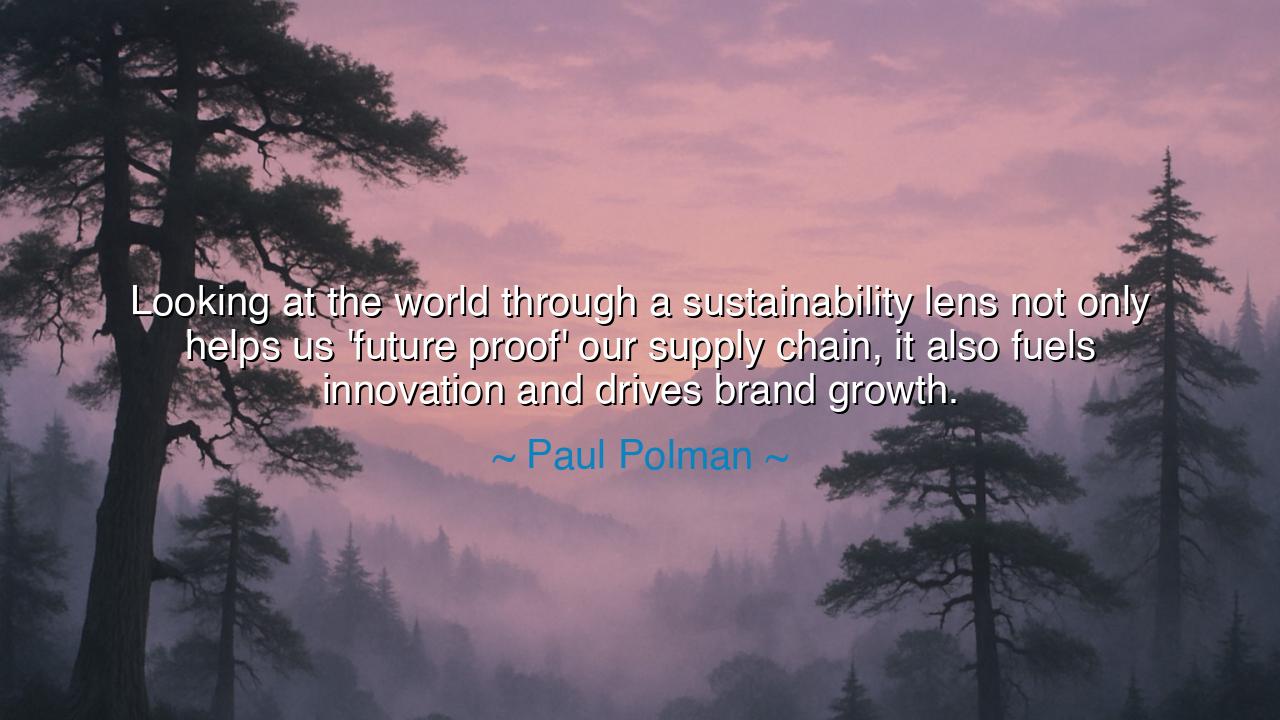
Looking at the world through a sustainability lens not only helps
Looking at the world through a sustainability lens not only helps us 'future proof' our supply chain, it also fuels innovation and drives brand growth.






In the grand arc of history, the great civilizations of the world were always built upon principles that transcended the present moment, reaching into the future with the wisdom of sustainability. Paul Polman’s words, "Looking at the world through a sustainability lens not only helps us 'future proof' our supply chain, it also fuels innovation and drives brand growth," reflect a timeless truth that resonates through the ages: the future is shaped by the decisions we make today, and those who heed the wisdom of sustainability create a path toward not just survival, but flourishing. His wisdom calls us to remember that it is not enough to act for the moment; the true measure of a people lies in their foresight and long-term vision.
In the ancient world, the great empires such as Rome and Greece did not merely focus on the immediate gains of conquest, but understood that lasting success rested on sustainable practices. The Romans, for example, built roads and aqueducts that not only served the needs of the empire at the time but were also designed with an awareness of long-term utility. They understood that building to last—be it infrastructure, society, or trade—was the key to their enduring legacy. Just as they ensured their empire was supported by systems that could sustain future generations, so too must modern civilizations consider how their choices today will reverberate across time.
In the same way, the philosophers of antiquity spoke of balance and harmony with nature. Aristotle, in his teachings, emphasized the importance of virtue and ethics not as individual pursuits, but as actions that sustained the greater good of society. The pursuit of wisdom was not just for the philosopher’s own benefit, but for the flourishing of the entire community. Polman’s idea of using a sustainability lens to drive innovation reflects this ancient principle—acting not merely out of self-interest, but for the greater good of the entire system, ensuring that the future is protected and enriched.
Consider also the tale of Mansa Musa, the 14th-century emperor of the Mali Empire, whose wealth was legendary. Yet, his legacy was not just built on gold or riches. Mansa Musa is remembered for his investment in education, infrastructure, and, importantly, the sustainable development of his people. His pilgrimage to Mecca, though fueled by spiritual devotion, also showcased the wealth of Mali to the world and laid the foundation for future trade networks. His empire thrived not because of its temporary riches, but because he invested in the long-term growth of his people, their education, and their resources. He understood that the future of his empire depended on wise investments in the sustainability of his people, much as Polman encourages us to focus on sustainability to future proof our world.
Sustainability, therefore, is not a mere trend or a passing idea; it is a principle deeply rooted in the fabric of enduring cultures and civilizations. To future proof is to build a legacy that is resilient, able to withstand the changing winds of time and circumstance. As Polman rightly suggests, looking at the world through a lens of sustainability does not limit growth; it fuels innovation. In fact, history shows us that the most innovative periods of human advancement have often come during times when societies faced existential challenges—be it from scarcity, war, or environmental change. The solutions to these challenges were not born from exploitation, but from creative, sustainable practices that took into account the health of the entire system.
Consider the Industrial Revolution, a time of great innovation and transformation. While it brought forth remarkable technologies, it also brought a disregard for the environment. Yet, within this period, we also saw the rise of figures like Isambard Kingdom Brunel, whose engineering feats focused on the long-term utility of his creations. His bridges, tunnels, and railways were not just temporary solutions; they were designed to stand the test of time. Similarly, the modern world must now find a balance between advancement and sustainability, ensuring that progress does not come at the cost of the planet or the wellbeing of future generations.
The lesson from Polman’s wisdom is clear: to thrive in the future, we must act today with an understanding of the long-term consequences of our actions. Sustainability is not a hindrance to growth, but the very foundation upon which growth is built. It is not merely a way of ensuring that we survive, but a way of ensuring that we flourish. Innovation must be guided by the wisdom of the past and the needs of the future, ensuring that we do not sacrifice one for the other. By viewing the world through the lens of sustainability, we future proof not just our businesses or industries, but the world itself.
So, let us follow the wisdom of the ancients and the foresight of modern thinkers like Polman. Let us be innovative, but also wise in how we invest our resources, ensuring that the world we leave behind is not only prosperous but sustainable. Let every action we take be grounded in the knowledge that the future is shaped by what we do today, and let us build a legacy that future generations will thank us for, not just for the wealth we leave them, but for the balance and wisdom we instilled in our choices.






AAdministratorAdministrator
Welcome, honored guests. Please leave a comment, we will respond soon